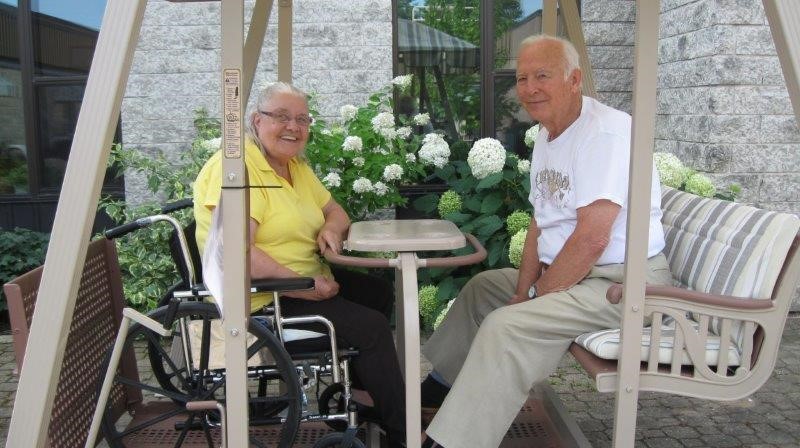 “It’s the rhythm. We just enjoy the moment and count our many blessings,” says Henry Klassen. Luella and Henry Klassen of Winkler, Manitoba have been married for 56 years. Although Luella’s dementia has reached a point that she can no longer speak, Henry has found a new way to connect with her…by swinging on Salem Home’s WhisperGLIDE swing. “Of all the things we’ve done in our life, this gets back to all the good old days. And those days are precious, you know.” (This is from an article that appeared in CBC News Canada.)
“It’s the rhythm. We just enjoy the moment and count our many blessings,” says Henry Klassen. Luella and Henry Klassen of Winkler, Manitoba have been married for 56 years. Although Luella’s dementia has reached a point that she can no longer speak, Henry has found a new way to connect with her…by swinging on Salem Home’s WhisperGLIDE swing. “Of all the things we’ve done in our life, this gets back to all the good old days. And those days are precious, you know.” (This is from an article that appeared in CBC News Canada.)
A 2001 study, published in Geriatric Nursing, researched the impact of a WhisperGLIDE swing used by 30 nursing home residents with dementia. The researchers measured the emotions of the residents before, during, and after a 10-day intervention in which the residents used a glider rocker for 20 minutes per day. The researchers discovered significant improvement in emotional pleasure and relaxation, decreased anxiety, depression and anger after just 10 minutes in the glider. “The use of the glider is safe for nursing home residents with dementia and can be used by family and volunteers in addition to staff. It is a practical and non-labor intensive intervention that represents an innovative approach to improving the care of people with dementia.”1
WhisperGLIDE swings offers a seat for everyone-whether one is able to walk or using a wheelchair. The swing’s exclusive attribute is its ability to bring together those confined to a wheelchair and the able bodied in a relaxed, socially inviting atmosphere. Since the entire platform swings, the wheelchair remains in a level plane so all occupants can enjoy the same relaxing motion simultaneously. A WhisperGLIDE provides a unique socialization environment by enhancing the ability to “connect” with loved ones, doing a shared activity that is enjoyed by all.
According to a study in 2009 by Biological Research for Nursing, data showed that patients with Alzheimer’s disease who spent time in rockers demonstrated “significant improvements in depression, anxiety and balance and a decrease in pain medication usage.”2 This study reaches the same conclusion of a study published in the American Journal of Alzheimer’s Disease and Other Dementias in 1998, which showed improved mental health by lessening depression and anxiety. Many patients also experienced pain relief, thus requiring less pain medication.3
“Just joy and happiness and pleasure. You know, it just doesn’t get any better,” Henry said of the swing. “It can be one of the most delightful things. It allows you to dream a little bit,” says Marilyn Nelson, director of care services at Salem Home in Winkler, Manitoba.
1 Geriatric Nursing, 2001:22(2):86-90
2 Biological Research for Nursing 2009:11(2):144-51
3 American Journal of Alzheimer’s Disease and Other Dementias, 1998:13(6):296-308
Visit whisperglide.com for more information.
+++
This is a sponsored bulletin. To learn more about BCCPA’s online promotional opportunities, click here.




